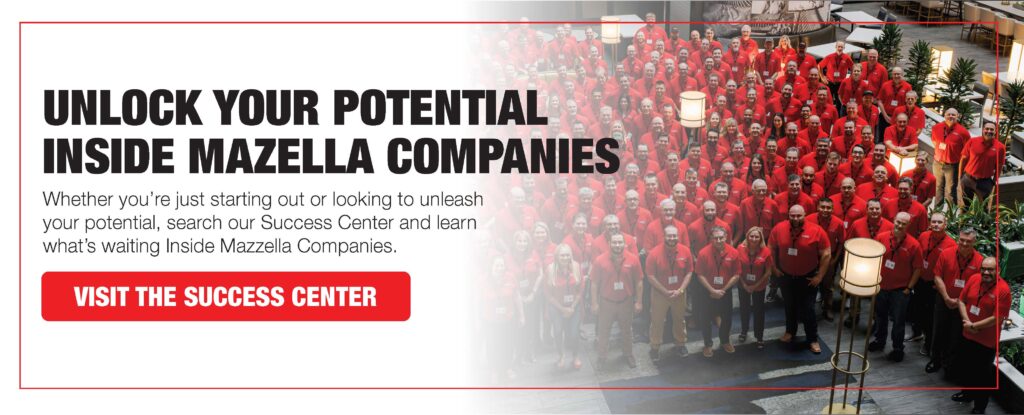According to the Oxford Dictionary, values are “the principles or standards of behavior – one’s judgment of what is important in life,” according to the Cambridge Dictionary, “a core value is a value or belief that is more important than any other.”
While many people have personal core values, according to a published study, core values are increasingly being found to be an essential element of being a part of a healthy workplace. The Scientific Committee on Education and Training even created a working group called Core Values at Work, whose goal is to build awareness about core values and their importance.
At Mazzella Companies, our core values began with Jim Mazzella, the Founder of our organization. Tony Mazzella, our CEO, often speaks of the impact his father’s legacy has on the way he still does business today.
Whether in a team meeting, at a company-sponsored event, or during a customer call, each team member at Mazzella Companies is committed to exemplifying our company’s core values and leaving their legacy.
We sat down with team members from across all sectors of Mazzella Companies to ask how these core values resonate in their day-to-day work and personal lives.
Thanks to:
- Angie Jakoski, Manager, Rigging Inspection Coordinators
- Joe Hinkel, Business Process Analyst
- Ben Bradley, Service Manager
- Nate Rosten, Outside Service Manager
- Jon Libava, Region Sales Manager-East
- Heather Rue, Accounting Lead
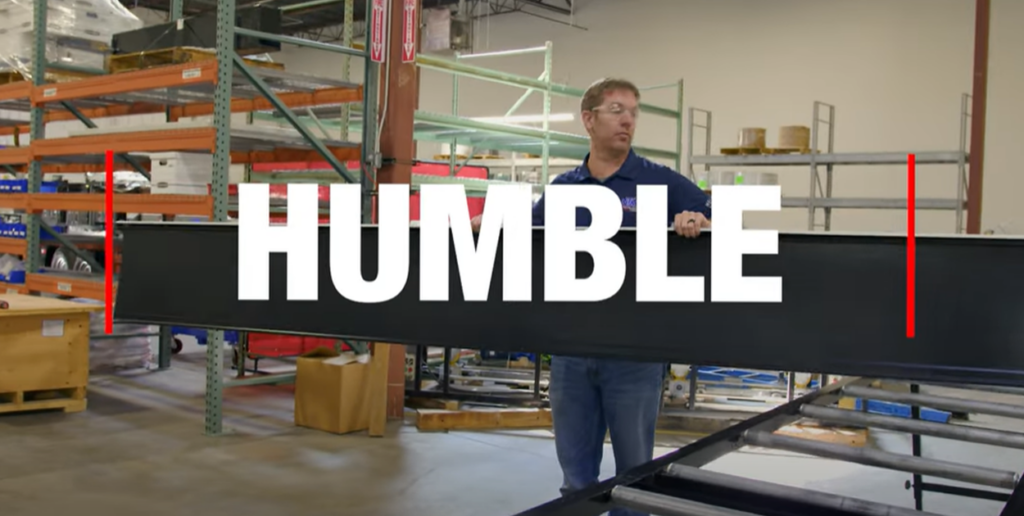
Humble (həm-bəl)- Lacking excessive ego or concerns about status. Always quick to point out the contributions of others and slow to seek attention of their own.
While clocking in for their shifts, Mazzella Companies’ team members are asked to leave something at the door – their ego.
Angie shared the importance of checking that ego, saying, “No one person is any better than anyone else in this company, and we’re all human beings. From the first phone call to the product shipped out the door, we’re all a part of that. Even if your hands may not physically be involved.”
For Nate, being humble means not always taking credit when things go right or avoiding the blame when things go wrong.
Joe added to that sentiment, sharing how he’s on a team that handles many projects that don’t always succeed and how humility is also about finding the lesson in failure. “I always think, ‘What can I take away from this? What did I learn from this?’ so we’re taking every opportunity to figure out where we can improve on the next project.”
Mazzella Companies’ team members find that an environment that supports the process of trying, failing, and trying again is always a result of trust in the collaborative process.
Joe says, “There has to be trust. It’s key in any relationship. It’s imperative for us to think that what we’re doing is imperfect. I may think the process I put in or the work I’m doing works, but it may not work for somebody else. The name on the front of the jersey is more important than the name on the back.”
It’s key to remember that mistakes happen, whether by us or others. Losing the play doesn’t mean you’ll lose the game, and staying humble and finding humor in these moments can help set the team back on a productive course.
Joe shared a time at work that made him wonder if more coffee was needed that day. “A lot of my job is to work out a different technological solution or optimization based on requests and how to improve processes. Recently, I went to run a test in our software, went and tried to put the process through, realized I was in the wrong place, and went to the next place thinking it was there. It was not there. I had to go back, and it took five tries to get to the right place.”
At Mazzella Companies, success involves everyone, from the team on the ground to the leaders at the top. It’s about acknowledging a job well done and creating open channels of communication across all levels of the organization.
Whether a team member is giving points to another for going above and beyond in our Peer Recognition System, winning the coveted Ideal Team Player award, or sharing their ideas with management during a catered lunch – connections are being built.
Joe said regular meetings on constant improvement have helped him forge relationships with management. “It’s management saying, ‘You can come to me with feedback. You can tell me if I’m doing something right or wrong.’”
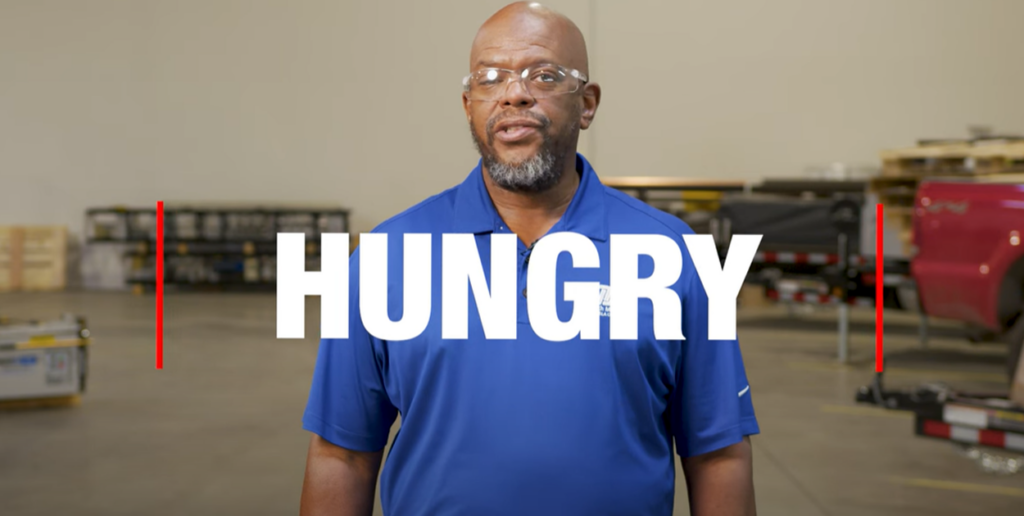
Hungry (həɳ-grē)- Always looking for more things to do, learn, and for responsibility to take on. Constantly thinking about the next step and the next opportunity.
Nate said that for him, being Hungry is always treating every day like it’s your first day on the job. “You want to go in and try to learn from everybody and continue to try to improve each day.”
Jon says it’s about not being content with where you are right now. “No matter what obstacles you have in your way, never give up. Commit to doing everything you can to reach your goals, and don’t rest on your laurels.”
Angie says being Hungry means always wanting to go after more, whether for yourself or helping a struggling teammate.
Joe says that while being Hungry does mean being that go-getter who wants to go the extra mile, it’s also about being consistent. “If I’m responding to somebody, and then I get the same question somewhere else, I want to try and make sure that I give a very similar, if not word-for-word, response to be consistent.”
On the topic of staying Hungry, Heather said that handling customer issues that require research keeps her Hungry. “I like to talk with them about getting the out of whatever pickle they’re in. I love investigating, and that’s why I love Accounting. It’s one of the reasons I came to Sheffield. If you have that drive, there’s no reason you can’t have great success here.”
Joe said that in his fast-paced work environment, he knows that something may fall through the cracks if he doesn’t have his finger on the pulse. “I set reminders for myself everywhere that will allow me.”
Ultimately, Hunger fuels your fire and gives you a reason to get back up after falling. Jon put it best, saying, “You’re going to get knocked down a lot in sales, and you have to be able to get up at least one more time.”
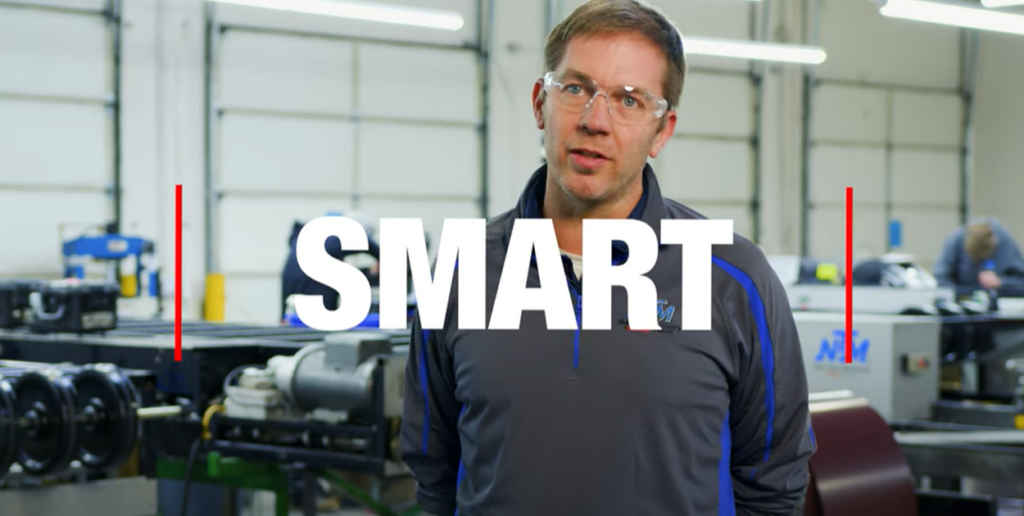
Smart (smärt)- Has common sense about people, knows how to deal with others in an effective way, and understands the impact of their words and actions in a group dynamic.
Being smart in this sense is not about having a high IQ. It’s about how you interact with others, how you manage your time, how you solve problems, and how you learn from your experiences and from others.
One of the aspects of being Smart is being able to coexist with others. Jon says being Smart is “an ability to read the room and understand who your audience is.” He explains that this skill helps him tailor his communication and presentation style to different customers and situations.
Similarly, Nate says that being Smart is “someone who’s engaged in the subject at hand, whether it be working on a machine or trying to help the customer solve the problem.” He adds that being smart also involves being respectful, honest, and helpful with everyone he encounters.
Angie says being smart is about being aware of your surroundings and “knowing when to speak up and when to listen, when to ask for help and when to offer it, and how to handle different personalities and situations.”
Ben says being smart is “being able to walk into a room and understand when people have issues, problems, they’re frustrated, they’re upset, and being able to gauge that setting without really having to talk too much or dig too deep. You can see you can see what’s going on with individuals.”
Being Smart is not about being the smartest person in the room but rather being open to learning from others and appreciating their perspectives.
Heather added, “Everybody’s culture is different, so everybody has different aspects that they bring to the table, different ideas. I feel like being smart is everybody bringing their ideas together and using them to come to a better understanding of a project.”
To foster this kind of collaboration, Mazzella Companies has invited the help of Dr. James Knight, author of Cultural Humility. In his book, he says that now, more than ever, leaders in the 21st century need the skills and capacity to thrive in a highly multicultural context.
In line with this need for these leadership skills, Mazzella Companies is offering a Leadership Training program for its team members. Heather says, “Leadership is important. Over the next year, the company will provide upcoming and existing managers with leadership skill classes.”
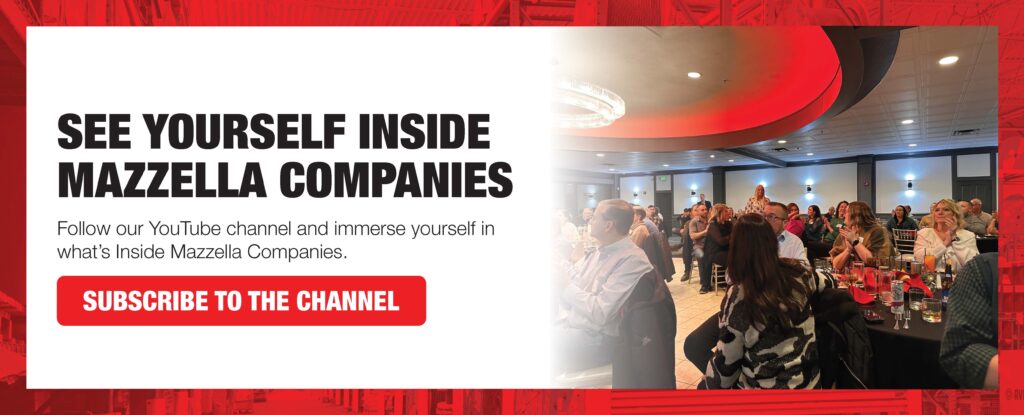
Being Smart is also about creating repeatable processes that help you organize your work and achieve your goals. Angie says she likes to come in every day and prioritize what she needs to do. “There’s a report I send the Executive Leadership team every morning, so I make sure that gets done first. Then, I’ll prioritize my emails, buy quotes, and orders. This helps me prioritize opportunities for the company and helps me stay on track throughout the day.”
Joe says being Smart also involves setting reminders, pinning responses, and creating a way to refer back to things. “It takes a lot of discipline,” he says. He says he uses many phone reminders and makes lists to keep himself organized and accountable.
Those appointments don’t need to be only with others, though. Sometimes, being Smart is setting time aside for your own goals. Jon suggests setting an appointment with yourself every day. “It’s a way to block off time on my calendar to work on the projects that I’m a part of and am responsible for.”
Being Smart is also about staying updated on your field’s latest trends and developments.
Joe says his favorite way to stay current is through the quarterly company newsletter. “I read it every time, and I think I like it so much because every article has a different piece of our company. You may not work with New Tech Machinery or Sheffield Metals or know how many great things they can do. I’m fortunate to know a lot of the people in our company, and I like seeing all the talented people we work with doing awesome things, and it really does help me in my position.”
Being Smart at the end of the day is about constant improvement. As Joe says, “Look at what we’re doing right now. We’re explaining how we act inside and outside of Mazzella Companies. It’s how we’re going to get better.”
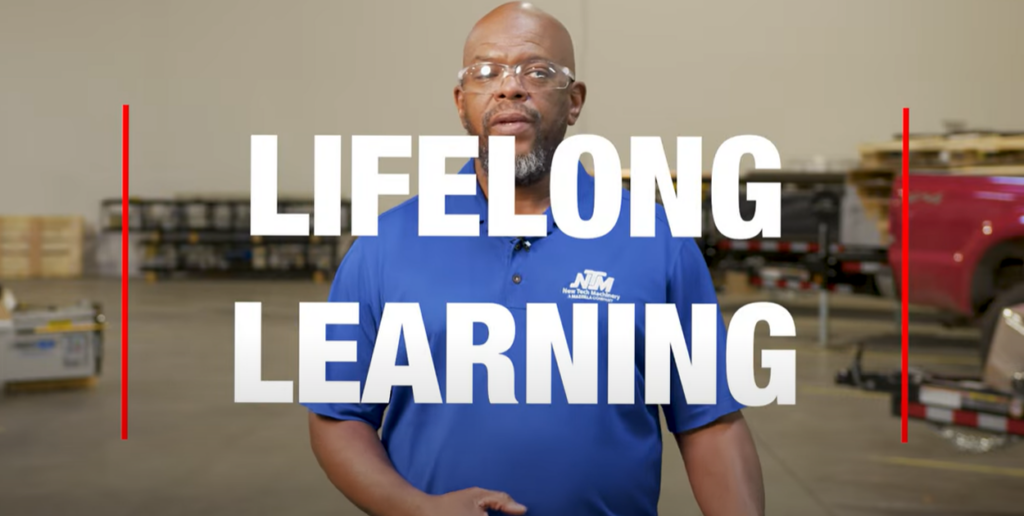
Lifelong Learning (lĭf-lȯɳ lər-niɳ)- The process of gaining knowledge and skills throughout your life, often to help you do your job properly.
Being a Lifelong Learner is about subscribing to the belief that you can’t grow anywhere if you stand still. It’s about being constantly curious, seeking different ways to learn, and routinely sharing knowledge with others because we learn by doing – we perfect by teaching.
Angie shared that in her 20 years of experience, she’s never been at a loss for something to learn. “It could be something as small as adding a part number into the system or something as big as knowing semi-standards.”
Nate said that he feels being a Lifelong Learner is all about keeping your finger on the pulse of new developments and new technologies within our business. “I always like to go on our competitors’ websites and see what new products they have to offer and components that they might use on their machines, what new profiles they might be introducing and testing.”
Heather says that right now she’s working hard towards being that Lifelong Learner in her Accounting department and developing her leadership skills. But, she said, it’s not always about learning for the sake of your profession. “To grow, building towards a goal, whether you want a higher position or you’re buying a house. If it’s something that you’re passionate about or you want to learn, find the people who can help you.”
Heather shared that learning how to drive a motorcycle has made her Ohio summers a lot more fun, while Angie shared how quiet evenings during the COVID-19 pandemic led her to learn how to use a dye cutter and make leather earrings. Jon shared that while he abandoned his dreams of repairing a 40-year-old vintage amplifier, he did do something recently he never thought he could learn to do – scuba diving.
Related: What Education Benefits Does Mazzella Companies Offer?
Joe shared how buying his home got him into his woodworking hobby and how that hobby helped his perspective at work. “I built some shelves for my house when I bought it six years ago. Next thing I know, I’m building a stand for my saw and finding other projects that I work on. Just like at work, there’s adversity that pops up. You might have a warped board, and you must figure it out. That’s the same for just about every project or optimization we have at work. It may not go according to plan, but it teaches you to fight through adversity, get creative, and come up with something. It really hit home because I now have more space in my garage.”
Along those same lines of being a Lifelong Learner at work and play, Joe shared another time when the two came together to help him grow. “I got to learn welding here. You may not be interested in becoming a journeyman or apprentice, but you can learn something you may not have known before. It’s having a curiosity for something that you’ve never done before, stepping outside of your comfort zone.”
Ben added that the high school he attended had an outdoor program he joined, which changed the rest of his life. “I’ve spent 15, 20 years going rock climbing and traveling all over the country, hanging out with friends, going to see a lot of different things.”
While Nate shared that he’s trying to be more proficient in Spanish to remove language barriers, Joe shared that removing barriers makes his job joyful. “Sometimes I get to help someone with a new process they want to put in to make others’ lives easier. The most fulfilling part of my job is putting in something that will help numerous people over the course of their day to try and remove that blockage they may have.”
Nate said the joy he finds in being a Lifelong Learner is not only learning but teaching. “I get a lot of joy in what I do working with our customers. I’ll go out to a customer and spend a few days showing them everything that they need to know to run the machine. Then I usually will hand them the tools and say, ‘Ok, now it’s your turn.’”
Another way Mazzella Companies helps teach others outside of the company to be Lifelong Learners is through their extensive online content libraries.
Whether it’s The Metal Roofing Learning Center, Rollforming Learning Center, or the Mazzella Learning Center, Angie thinks our library is one of the best ways we share information. “A lot of customers and non-customers alike see our company out there. I feel confident that no question is too small. I think if you’re not asking questions, you’re not learning the truth.”
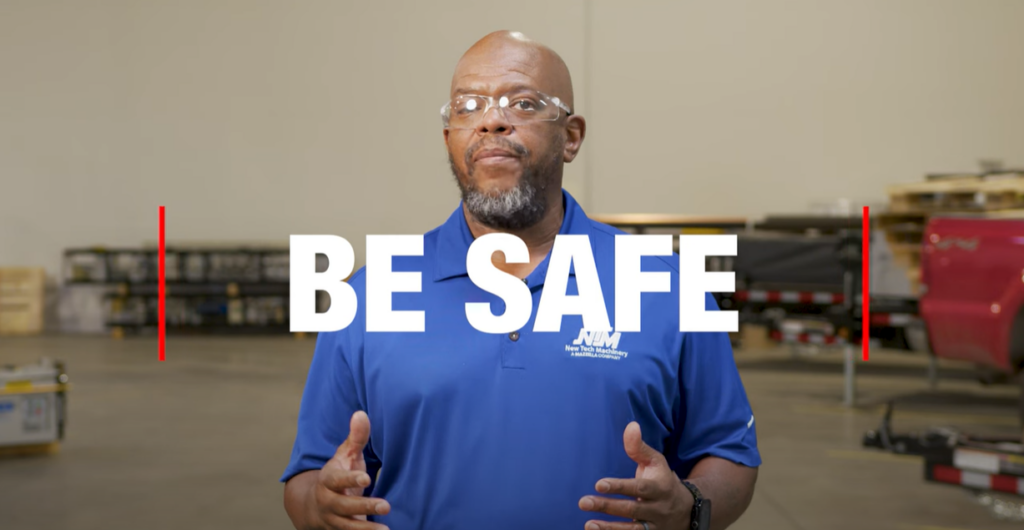
Safe (sāf)- Continuously thinking about the risks and dangers associated with the job and how they can help create a safer environment for everyone.
Being Safe is not a one-time thing you do or don’t do. As Angie says, being safe means “common sense, being aware of your surroundings, and watching out for others.”
Nate agrees that being Safe is about using common sense. He says an accident can happen anytime, and you should always have that at the forefront of your mind when working. “I truly believe that. That’s why I have all ten fingers.”
Another aspect of being Safe is incorporating the processes and procedures that are in place daily to ensure your safety and the safety of others. Heather says, “My husband’s out in the shop, so I know he’s safe. There’s a lot of hard work out there.”
Another aspect of being Safe is speaking up and communicating when you see something unsafe or are unsure about something. Joe says being Safe is about knowing where you are, the situation, and your plan if things don’t happen as planned. “At the end of the day, we all want to get home safe.”
Joe also says that being safe means having the courage to speak up and say you do not know if something is safe. “Even more importantly, if you don’t know your situation, say something and have the courage to speak up and say that you don’t know if this is safe.”
Jon says being Safe means communicating a lot, “Being safe, being careful, communicating a lot, whether with coworkers or other people on the job site. Having an extra set of ears and eyes and anticipating things is part of it, too.”
A lot of communication about Safety can be found in many of the Learning Centers mentioned earlier in this article. Nate says, “It’s how we speak to the industry, and that’s really what makes us the leader because no one else is providing content on such a consistent basis.”
Ben added, saying, “The fact that we’re here doing this video, talking to you, doing training the trainer videos, doing service videos, you know, putting out articles. I think we really made an effort just to try to communicate with customers without having a conversation.”
Leaving a Legacy
Core Values help us align our vision, mission, and culture. They help us create a positive and productive environment where everyone can thrive and grow. At Mazzella Companies, our Core Values are not just words on a wall but a legacy we leave – a legacy built on being Humble, Hungry, Smart, a Lifelong Learner, and Safe.
